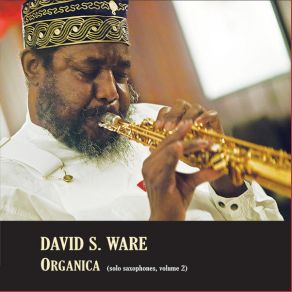Organica (Solo Saxophones), Vol. 2
Download links and information about Organica (Solo Saxophones), Vol. 2 by David S. Ware. This album was released in 2011 and it belongs to Jazz, Avant Garde Jazz genres. It contains 4 tracks with total duration of 01:17:30 minutes.

|
|
|---|---|
| Artist: | David S. Ware |
| Release date: | 2011 |
| Genre: | Jazz, Avant Garde Jazz |
| Tracks: | 4 |
| Duration: | 01:17:30 |
| Buy it NOW at: | |
| Buy on iTunes $9.99 | |
Tracks
[Edit]| No. | Title | Length |
|---|---|---|
| 1. | Minus Gravity 1 | 16:20 |
| 2. | Organica 1 | 24:31 |
| 3. | Minus Gravity 2 | 22:27 |
| 4. | Organica 2 | 14:12 |
Details
[Edit]On the second volume in a planned series of David S. Ware solo concerts, Aum Fidelity presents him in a different context than on Saturnian, which showcased the great saxophonist on tenor, stritch, and saxello. The two concerts presented here — one was recorded at a private, invite-only event in Brooklyn in the spring of 2010, the second showcased him at Chicago's Umbrella Festival in November of that same year — feature Ware with his tenor, and the newest tool in his creative arsenal, the sopranino saxophone. As a result, the contrast between these gigs and those on Saturnian is often stark. Playing sopranino in "Minus Gravity I," Ware is wonderfully unhurried in his approach, allowing his ideas to develop piecemeal from short phrases into longer, seemingly sung lines. They touch on past masters not only from jazz but from Middle and Far Eastern classical music as well. The linking of his thought and practice is always cast in favor of melodic concept, albeit not in the usual Western sense of harmony, but not exclusively outside it, either. "Organica I," with Ware on the tenor, begins by digging directly into the blues of players like Coleman Hawkins and Sonny Rollins before spiraling through Coltrane's modal explorations and finally into Ware's own innovative sphere. "Minus Gravity 2," also with Ware on the sopranino, actually stays closer to the origins of jazz tradition than its like-named predecessor. This doesn't mean that Ware doesn't explore, because that is what he does incessantly, but he observes and builds on the parameters of jazz' various eras — even when playing on the outside rims — in that context. "Organica II," with Ware on tenor, builds from Ben Webster and Lester Young, as well as Ware's aforementioned Muses, and reaches for the stratosphere on his horn. Through it all, the full fruition of Ware's musical thought is displayed for the listener progressively, revealing his sense of innate logic, architecture, spiritual discipline, and instinct. All told, Organica makes for an utterly pleasurable exercise in listening.